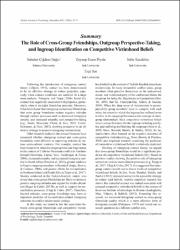| dc.contributor.author | Bağcı, Sabahat Çiğdem | en_US |
| dc.contributor.author | Piyale, Zeynep Ecem | en_US |
| dc.contributor.author | Karaköse, Selin | en_US |
| dc.contributor.author | Şen, Ezgi | en_US |
| dc.date.accessioned | 2022-05-24T19:49:59Z | |
| dc.date.available | 2022-05-24T19:49:59Z | |
| dc.date.issued | 2021-12 | |
| dc.identifier.citation | Bağcı, S. Ç., Piyale, Z. E., Karaköse, S. & Şen, E. (2021). The role of cross-group friendships, outgroup perspective-taking, and ingroup identification on competitive victimhood beliefs. Türk Psikoloji Dergisi, 37(88), 72-75. doi:10.31828/tpd1300443320191203m000034 | en_US |
| dc.identifier.issn | 1300-4433 | |
| dc.identifier.uri | https://hdl.handle.net/11729/4357 | |
| dc.identifier.uri | http://dx.doi.org/10.31828/tpd1300443320191203m000034 | |
| dc.description.abstract | In conflict-ridden societies, both groups often believe that they are the sole undeserved victim of the conflict. The current study aimed to examine Turkish and Kurdish ethnic group members’ competitive victimhood beliefs in the context of intergroup contact theory and investigate whether two social-psychological variables – outgroup perspective-taking and ingroup identification – significantly mediated this association. The sample consisted of 234 participants (142 Turkish and 92 Kurdish; 152 Females, 81 Males, 1 Unknown; Mage = 22.39, SD = 3.96). Participants completed online surveys including demographic information, and measures of intergroup contact (cross-group friendship quality), outgroup perspective-taking, ingroup identification, and competitive victimhood beliefs. Findings demonstrated that the quality of cross-group friendships was negatively associated with competitive victimhood beliefs and as expected this association was significantly mediated by increased outgroup perspective-taking and decreased ingroup identification. Results imply the need to study intergroup contact and competitive victimhood beliefs simultaneously to facilitate the understanding of reconciliation processes in conflictual intergroup relationships. | en_US |
| dc.description.abstract | Gruplar arası çatışmanın yüksek seviyede hissedildiği toplumlarda, her iki grup da kendi üyelerini çatışmanın haksızlığa uğramış tek kurbanı olarak görür. Bu çalışmanın amacı Türkiye’de yaşayan Türk ve Kürt katılımcılar arasında rekabetçi mağduriyet algısını (Competitive Victimhood Beliefs) gruplar arası temas (Intergroup Contact) bağlamında incelemek ve bu ilişkiyi açıklayabilecek iki sosyal-psikolojik değişkenin – dış grubun bakış açısını alma ve iç grupla özdeşleşme – aracı rolünü test etmektedir. Çalışmaya farklı illerden toplamda 234 katılımcı (142 Türk, 92 Kürt; 152 Kadın, 81 Erkek, 1 Bilinmeyen, Ortyaş = 22.39, S = 3.96) dahil edilmiş; katılımcılara demografik form, gruplar arası arkadaşlık niteliği, dış grubun bakış açısını alma, iç grup kimlikle özdeşleşme ve rekabetçi mağduriyet ölçeklerini içeren çevrimiçi anketler dağıtılmıştır. PROCESS makrosu ile incelediğimiz aracı modelinde, gruplar arası arkadaşlık niteliğinin rekabetçi mağduriyet ile doğrudan ilişkisinin olumsuz olduğu, bu ilişkinin artan dış grubun bakış açısını alma ve azalan iç grupla özdeşleşme ile açıklandığı bulunmuştur. Sonuçlar çatışmalı grup ilişkilerinde uzlaşmanın sağlanmasında, gruplar arası temas ve rekabetçi mağduriyet algısının bir arada incelenmesinin önemini ortaya koymaktadır. | en_US |
| dc.language.iso | eng | en_US |
| dc.publisher | Turkish Psychologists Association | en_US |
| dc.rights | info:eu-repo/semantics/closedAccess | en_US |
| dc.subject | Intergroup contact | en_US |
| dc.subject | Cross-group friendships | en_US |
| dc.subject | Competitive victimhood beliefs | en_US |
| dc.subject | Outgroup perspective-taking | en_US |
| dc.subject | Ingroup identification | en_US |
| dc.subject | Gruplar arası temas | en_US |
| dc.subject | Gruplar arası arkadaşlık | en_US |
| dc.subject | Rekabetçi mağduriyet algısı | en_US |
| dc.subject | Dış grubun bakış açısını alma | en_US |
| dc.subject | İç grup kimlikle özdeşleşme | en_US |
| dc.title | The role of cross-group friendships, outgroup perspective-taking, and ingroup identification on competitive victimhood beliefs | en_US |
| dc.title.alternative | Rekabetçi mağduriyet algısını yordamada gruplar arası arkadaşlıklar, dış grubun bakış açısını alma ve iç grupla özdeşleşmenin rolü | en_US |
| dc.type | editorial | en_US |
| dc.description.version | Publisher's Version | en_US |
| dc.relation.journal | Türk Psikoloji Dergisi | en_US |
| dc.contributor.department | Işık Üniversitesi İktisadi, İdari ve Sosyal Bilimler Fakültesi Psikoloji Bölümü | en_US |
| dc.contributor.department | Işık University, Faculty of Economics, Administrative and Social Science, Department of Psychology | en_US |
| dc.contributor.authorID | 0000-0002-0871-5751 | |
| dc.contributor.authorID | 0000-0001-8629-4422 | |
| dc.contributor.authorID | 0000-0002-8968-8205 | |
| dc.identifier.volume | 37 | |
| dc.identifier.issue | 88 | |
| dc.identifier.startpage | 72 | |
| dc.identifier.endpage | 75 | |
| dc.peerreviewed | Yes | en_US |
| dc.publicationstatus | Published | en_US |
| dc.relation.publicationcategory | Makale - Uluslararası Hakemli Dergi - Kurum Öğretim Elemanı | en_US |
| dc.contributor.institutionauthor | Piyale, Zeynep Ecem | en_US |
| dc.contributor.institutionauthor | Karaköse, Selin | en_US |
| dc.contributor.institutionauthor | Şen, Ezgi | en_US |
| dc.relation.index | WOS | en_US |
| dc.relation.index | Social Sciences Citation Index (SSCI) | en_US |
| dc.description.quality | Q4 | |
| dc.description.wosid | WOS:000763024400001 | |


















